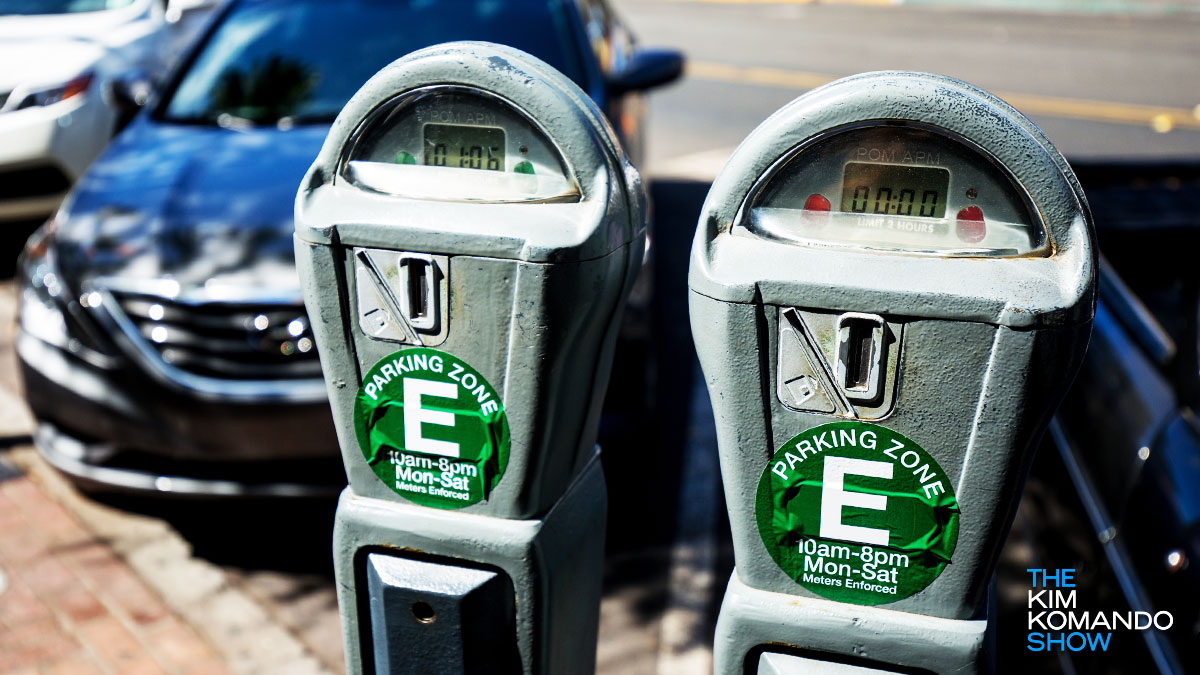Scammers have a new money-stealing trick: Fraudulent QR codes on parking meters

In many cities around the country, finding a parking spot can be a nightmare. When you manage to get one, you also have to contend with the parking meter. Never lose your car in a parking lot again with this clever trick.
Popping a few coins in the slot seems simple, but it presents a challenge when you don’t have any change. A handy solution? Pay electronically through your phone. In many cases, you scan the QR code on the meter and you’re all set.
Or are you? Read on to discover why QR codes have become a growing problem and how scanning them could cost you big time.
Here’s the backstory
Quick Response (or QR) codes have been around for some time. You’ve likely seen them on posters, restaurant menus, or in parking garages. The squares look like they consist of random lines or patterns, but they can store a lot of data.
In most cases, when you scan a QR code through your mobile device’s camera, you will be taken to a specific website. For restaurants, many establishments have moved to a QR code-based system where you can scan it to see the menu.
However, scammers have been sticking QR codes on parking meters in recent days. The goal is to trick drivers into thinking that they can pay for their parking by scanning the code. But in reality, it will take them to a fake website that will capture and steal their banking details.
It has become such a problem that the Austin, Texas police department issued a warning for drivers not to use the fraudulent QR codes.
As Kim recently explained on her radio show: “People think that they are paying for parking when they are actually at a fraudulent site scamming credit card numbers and money. Don’t fall for it.”
What you can do about it
While the Austin police have highlighted the growing problem, it will only be a matter of time before it spreads to other parts of the country. With the help of media exposure, one of the fake sites has already been taken offline.
If you're prompted to update Flash Player, ignore it!

Millions have used the popular Flash software from Adobe over decades. But the technology was eventually killed off in 2020. One reason it went away is it posed many security risks. Microsoft even released a patch that forcefully removes it.
Windows alert: Hackers are using a 9-year-old flaw to break into PCs

Criminals and hackers will always exploit vulnerabilities, but software companies try to stay ahead of them. Tap or click here to see how malware can expose your browser passwords.
A big problem is that malware is constantly being adapted to circumvent any security efforts. Companies like Microsoft and Google can only patch what they know about, and sometimes hackers circle around to exploit old vulnerabilities.
9 clever ways cybercriminals want to steal your hard-earned cash this month

The holiday season is a time for celebration and spending with family. So, the last thing that you want to do is sit on the phone with your bank, trying to clear up unauthorized transactions. Tap or click here for examples of shopping scams spreading now and ways to protect your wallet.
Think you know all the government impersonator scams? Watch for this scary twist

Scammers are known for switching up tactics to catch potential victims off guard. Doing so makes it difficult for people to keep track of new schemes and what to be aware of. But sometimes, the criminals can’t resist falling back into old habits.
A warning to Costco customers - Card skimmers spotted stealing card info

Shopping online comes with hidden dangers, and many are still uneasy about the process. Those people usually prefer to go into a physical store, as they deem it somewhat safer. But that isn’t always the case.
Card payment facilities are incredibly vulnerable to attack from hackers or criminals, as they have had years to refine their techniques. Recently card skimmers have been running rampant around the country.
Microsoft is emailing out gift cards (No, it's not a scam)

Phishing scams usually try to entice victims to click on malicious links. Those links can lead to fake websites where scammers hope you will enter personal details or banking information for them to steal. Tap or click here to see a recent fake invoice from Microsoft scam.
These 151 apps caught scamming millions of people

The Google Play Store for Android is stacked with applications for almost anything imaginable. Most of the apps are developed by programmers who want to make users’ lives easier or more enjoyable.
But then you have developers who want to cause misery and rip people off. Just because an application is available for download in the Google Play Store doesn’t mean that it’s harmless. Tap or click here to see how Apple made it easy to report App Store scams.
Is banking on your phone safe? 6 ways to make sure you're not scammed

Banking on your phone opens up a whole new world of convenience — as well as a new world of risks. Nowadays, you don’t have to drive down to your local bank branch to make a deposit. Instead, you can bank from the comfort of your home.
Signs someone opened a bank account in your name - And what to do about it

Bad credit comes with many problems, like higher interest rates and rejected home and vehicle loans. That’s why you should look out for the one threat that can tank your credit score: identity theft. If a scammer steals your identity, they can drain your accounts and obliterate your financial security.
Got a warning you need to update your phone? It might be malware

There are plenty of ways hackers try to steal your banking information and personal data. Spam or phishing emails are incredibly effective, and so are personalized malicious text messages.
Hackers have also been found to create fake apps that look strikingly like the real thing. Once you install it, your mobile phone will be infected with malware. But taking that one step further, a group of hackers is now trying to convince you that your phone is already infected.
Set up your financial accounts like you're going to be hacked

Raise your hand if you manage your finances online. Most of us stopped going to the bank during the pandemic, and once you realize how easy it is to get things done from your phone or computer, why go back?
But some of the biggest cyber threats we face today are banking Trojans — malicious programs that hunt for bank information while disguising themselves as harmless documents. They can scan what you type, steal your money and compromise all of your most sensitive passwords. These often come loaded in malicious apps. Tap or click for more info on apps recently caught stealing bank credentials.
Booking a restaurant reservation? Scammers have a new tactic to steal your money

When you make a reservation at your favorite restaurant, you would reasonably expect them to have a seat available for you. But one thing that you definitely don’t want to get with your order is a side serving of fraud drizzled in stolen money.
This tricky new email campaign cons YOU into calling scammers

Scammers sometimes use targeted emails to draw you into a malicious website, called phishing. This is just one way they target you.
By leaving voice messages on your mobile phone, scammers will also try to trick you into sending them your personal information. This type of scam is called vishing, and it has become more widespread in recent months.
Clever sweepstakes scam targets your banking info

Sweepstake scams have been around almost for as long as the competitions have. If there is any situation where money can be made or stolen, you can bet your bottom dollar that scammers won’t be far behind.
AARP’s Fraud Watch Network was recently alerted to a sweepstakes scam making the rounds. The scammers have been targeting the elderly by telling them that they have won a prize. In another scam, they claim to be from the FBI. That is obviously not true, and they only want to steal your banking information.
Delete yourself from this creepy site that collects email addresses, phone numbers and much more

There are many pieces of information that cybercriminals and scammers are after. Your personal information, Social Security number, search history and banking details are all valuable commodities.
By stealing your credit/debit card details, criminals could clean out your financial accounts. But with your private and personal information, they can steal your identity and cause even more damage.
Gas pump skimmers can steal your money - How to spot them and protect your credit card

You wouldn’t think your local gas station is a hotspot for cybercriminals. But you’d be wrong. These crafty thieves have been ripping people off for years at gas stations.
The common method is through card skimming and can be done in the blink of an eye. Criminals attach a card reading device to the pay point at the pump and capture your credit or debit card’s details. Tap or click here to see the difference between skimmers and shimmers.
Dangerous apps can ruin your phone - How to protect yourself

If Android is your platform of choice, now is the time to make sure your device is protected and you are not at risk of having your data and finances compromised.
We always recommend only downloading apps from the Google Play Store, as third-party app stores are not as secure. But, sometimes, malicious apps will even make their way into official app stores. Tap or click here for a recent list of 30 apps infecting Android devices.
Use Zoom? This screen-share bug may expose more than you think
The pandemic has forced many businesses to evaluate the feasibility of staff working from home. While on paper it might work, line managers initially struggled to find an easy way to connect with their team. That is where video calling services like Zoom stepped in.
Clubhouse for Android? No, it's a fake hiding malware
People seem to always want things they can’t have. It can be a dangerous way of thinking and can lead to unintended consequences. The latest example is the invite-only social media site Clubhouse. Tap or click here to see what Clubhouse is.
